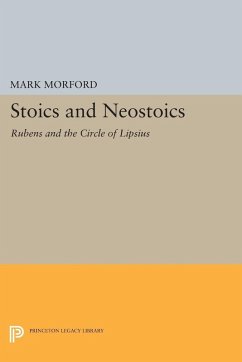In a vivid re-creation of late sixteenth-century Flemish intellectual life, Mark Morford explores the intertwined careers of one of the period's most influential thinkers and one of its most original artists: Justus Lipsius and Peter Paul Rubens. He investigates the scholarship of Lipsius (1547-1606), whose revival of Roman Stoicism guided his contemporaries during the revolt of the Netherlands from the rule of Spain and whose teaching prepared future leaders in church and state. Maintaining that Lipsius' thought reached Peter Paul Rubens through his brother, Philip Rubens, Morford analyzes the artist's use of Stoic philosophical and political allegory, beginning with his painting The Four Philosophers. This book discusses the revival of Stoicism in northern Europe, focusing on Lipsius' editions of Tacitus and Seneca, his widely read handbooks on constancy and politics, and his interaction with leading scholars and public figures. As his letters reveal, Lipsius was inconsistent in his life and unsuccessful in reconciling Stoicism with Catholic doctrine; Rubens, although at first sympathetic to the doctrines of Lipsius, is shown to have later transcended their limitations.
Originally published in 1991.
The Princeton Legacy Library uses the latest print-on-demand technology to again make available previously out-of-print books from the distinguished backlist of Princeton University Press. These editions preserve the original texts of these important books while presenting them in durable paperback and hardcover editions. The goal of the Princeton Legacy Library is to vastly increase access to the rich scholarly heritage found in the thousands of books published by Princeton University Press since its founding in 1905.
Originally published in 1991.
The Princeton Legacy Library uses the latest print-on-demand technology to again make available previously out-of-print books from the distinguished backlist of Princeton University Press. These editions preserve the original texts of these important books while presenting them in durable paperback and hardcover editions. The goal of the Princeton Legacy Library is to vastly increase access to the rich scholarly heritage found in the thousands of books published by Princeton University Press since its founding in 1905.









